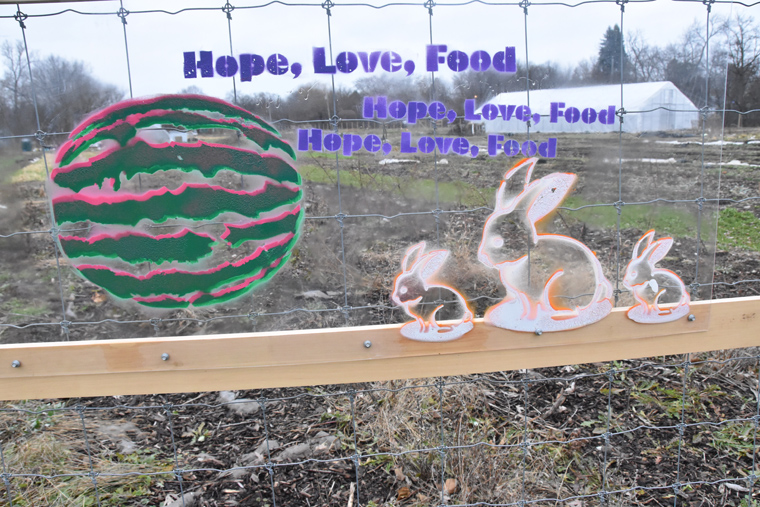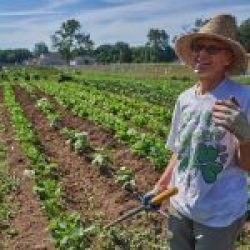Many different crops will be offered in 2019 at Syracuse operation
By Tom Maguire | Associate editor
The collard greens rate a “10” and the Swede midge gets a zero.
The Brady Faith Center Farm in the Valley of Syracuse is planning a big season and is already growing micro-greens and oyster mushrooms indoors and carrots and spinach outdoors.
Last week, a farm passerby said she cooks the meat first, then puts the perfect additive — the collard greens — into the pot.
“That’s wonderful,” Farm Coordinator Jessi Lyons said about the customer’s feedback. “I’m really happy about that. … We try our best.”
All farms learn from trial and error, she said, so this season there will be no broccoli crop; the Swede midge pest finds it too tasty. And a plant called love-lies-bleeding produced a situation of stinkbugs-lie-gorging, so that plant is out as well.
However, the farm now has a six-foot-high fence that keeps the deer out. Despite the fence, there was one major theft on the property, Lyons said.
Brady Farm, she said, is an affordable source of produce for the community. All proceeds go back into the farm, which employs young people and people who may not have a lot of workforce skills. Lyons said the farm changes the face of the neighborhood and offers visitors a chance to experience nature in a peaceful setting.
The farm sells produce at its own stand and also at the CNY Regional Market in Syracuse. Because it cannot control how neighbors use their own land, the farm is not certified as organic. But the farm does use organic practices, pays a fair rate, and treats the land sustainably, Lyons said.
Kevin Frank, the executive director of the Brady Faith Center, summarized the achievements of the farm in an email:
“When Jessi, Alice [Gallagher], and Danielle [Allen], our talented and hardworking leadership team at the Brady Farm, feel overwhelmed with the challenges and the amount of work in urban farming, I remind them to look at what’s been accomplished in just three years:
“From vacant city property to 3 acres of beautiful urban farming plus a beautiful wooded trail and community gathering space.
“From no structures to two storage units, a cleaning and packing area and two large hoop houses to extend the growing season, all installed with electricity.
“From wheelbarrows to a new tractor for moving topsoil, manure, and compost. … Increasing each year the amount of … locally grown food as well as the numbers of people employed from our community.
“Helping people believe and envision themselves as urban farmers and slowly changing our diets from, ‘Vegetables — no, I don’t like them!’ to ‘Wow, they’re really good — I had no idea!’
“To everyone involved in making our dream a reality, thanks for improving our community health and giving us hope that positive change and transformations are possible.”
Even now, as winter begins, Brady Farm is growing enough micro-greens and oyster mushrooms to supply 25 families. Those crops are doing fine in a heated shed, thanks to a major donation of equipment and labor from O’Connell Electric Co., which supplied access to electricity across the farm.
Micro-greens are “densely nutritious,” Lyons said. They include some herbs, red cabbage, chards, sunflower watercress, and sunflower kale — things that can be used for salad toppings, tacos, burritos, and even green smoothies.
Oyster mushrooms are tender, delicate, and delicious elements of Asian cuisine, she said.
Other benefactors of the farm include many volunteers who have different skills; 100 Women Who Care CNY, which donated money to buy a tractor for moving materials; donors at the farm’s annual breakfast; and the Gifford Foundation, which awarded a grant to build a pavilion that will be used for classes and feasts. “Very exciting,” Lyons said.
One terrific farm benefactor is Joshua Aitken, a ninth-grader at Jamesville-DeWitt High School. Joshua is an Eagle Scout candidate for Troop 22. His Eagle Scout group redid Brady Farm’s trail in the woods and established an outdoor classroom. Lyons said they did a nice job clearing out the area for group activities.
In an email, Joshua said: “I did this project at the Farm because I was an Eagle Scout Candidate looking for a project that I knew would positively impact the community. After touring the Farm, I knew I wanted to do my Eagle Project there because of how many people would benefit from the trail and educational space. The Brady Faith Center does great work for the city of Syracuse and it was an honor to help them out.”
Also helping were food-studies students from Syracuse University. They created artwork for signs posted at various spots along the fence. The signs offer narratives about the history of the farmland and our relationship with food. “Really cool project,” Lyons said.
The farm also has two greenhouses, called high tunnels. The big tunnel will have plants in the ground starting in February and other varieties will be in there into February of next year. The small “propagation” tunnel will be used from March through October. Greenhouse air is 10 to 20 degrees warmer than the outside air. In fact, if it ever gets up to 60 degrees inside, fans will blow the hot air out. For early planting, crops like spinach, radishes, lettuces, kale, and cabbage don’t mind the cold.
Her operation will emphasize “more of the things people really love,” Lyons said. Everybody likes lettuce, carrots, and onions, she said, and most people like watermelon. The farm will still grow peppers, she said, but not as many different varieties.
Last year, the farm sold sour gherkins to Alto Cinco Mexican restaurant in the Syracuse University area. Sour gherkins, Lyons said, are a tiny little cucumber, about an inch and a half long and “yummy.” Brady Farm will be seeking more ways to work with restaurants.
Because the customers asked for them, the farm will also sell seedlings: herbs, tomatoes, and flowers. To prevent Swede midges from leaving the site, seedlings for kale and collards will not be sold.
Carrots and spinach will be ready to harvest in April. Plenty of crops will be growing in May, and the farm totally busts out in July.
Lovers of cherry tomatoes, take note: They’ll be ready by the Fourth of July.
How to get Brady Farm products
Go to Bradyfarm.org in order to contact Farm Coordinator Jessi Lyons, volunteer, or sign up to purchase groceries (Community-Supported Agriculture, or CSA). Email: BradyFaithFarm@gmail.com.
The CSA season will be 21 weeks starting June 8.
Weekly box: $420: 6 to 10 items, averaging around 9.
Every other week:$250: average of 9 items.
Regional Market: $275: 5 items picked up weekly.
Times and locations: 7 a.m.-2 p.m. Saturdays, CNY Regional Market, 2100 Park St., Syracuse, by the baseball stadium. Times for the Brady Farm’s stand are not set yet.







